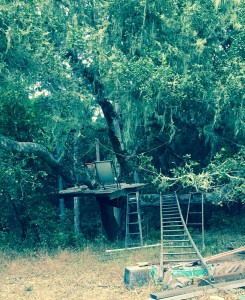
 Yesterday I taught a day-long workshop on rewriting and editing one’s work for Clarion West. I usually do this as a two hour online workshop, so it was interesting to take the class and get a chance to really flesh it out, particularly since I can use this version to create an on-demand version.
Yesterday I taught a day-long workshop on rewriting and editing one’s work for Clarion West. I usually do this as a two hour online workshop, so it was interesting to take the class and get a chance to really flesh it out, particularly since I can use this version to create an on-demand version.
As with all writing advice, mileage will vary according to the individual. The best thing as a writer that you can do is to pay attention to your own process and make it more effective. Experiment with lots of things, identify the practices that work, and incorporate them into your process. Keep experimenting, mixing things up a little, every once in a while, writing to the sound of whale songs, or dictating while hiking, or using a pen rather than the keyboard — it doesn’t matter what as long as you keep testing things in a way that lets you grow as a writer.
...

The book is scheduled to be released at Emerald City Comicon next year, so you may see why the time pressure has stepped up in intensity. I told myself I’d get it done this year, and I have, along with a whole bunch of stories, not one but two collections, the update of Creating an Online Presence for Writers, a bajillion trips, and opening the Rambo Academy for Wayward Writers, including cool new classes from Rachel Swirsky and Juliette Wade, so I feel darn good about how much I got accomplished this year despite SFWA’s demanding maw chewing up my time on a consistent basis.
I thought, however, it would be useful perhaps for people grappling with novels to see what the last bits of work involve. I’ve been incorporating edits from the hardcopy manuscript but still have lots and lots of comments in the e-copy to address. In the process of adding those, I was able to look at the manuscript from a high-enough level that I could sort out all the chronology (oh dear GODDESS please let that statement be true, because that’s been the biggest pain in the rear so far) and make sure that everything made sense, that storylines were resolved, and that all the hidden plotlines got bubbled up in a meaningful way.
I’m adding in a few stray scenes that got dropped somehow, and then I’ll do the following passes (this is taken from the TODO list currently hovering at the beginning of the manuscript in Scrivener).
I’ll get through as many of these today as I can, but at some point I’ll have to print it out, because I want to take it on the road with me. I’m headed to a conference on nonprofit storytelling (ha) on Wednesday and back on the 13th, which is a complication I really wish I hadn’t introduced into my life, along with a class I’m teaching on the 12th (ditto the regret for the timing, but it’ll be a fun class), which is one reason I deserve a little Skyrim next Monday.
Anyway, here’s the todo list that I’ve been making as I went through and added my edits in:
Do a search on:
“¢ One of, not for the first, little, square
“¢ Penny-wides (penny)
“¢ Swam, abandon, tilt
(These are words I’ve noticed I use a lot, and I want to make sure they’re not over-used or consistent.)Points that need to be checked or addressed:
Position of Temples on Beasts
Is Lucy set up as a name?
Are there too many duplicate things, like Lucy getting dismissed twice, multiple fights with Eloquence, etc? Outline events and examine.Echoes:
Terra-cotta trade god dolls
Riot and Duke’s OccasionPasses that need to be made:
“¢ Titles and capitalization
“¢ Read through each person’s story and map out times against BoT
“¢ Mapping pass – streets align
“¢ Trade God pass, check all the names against morphology
“¢ Names – consistent Bannister/Faustino, Serafina/whatserface, Marta/Ruhua, all of Elo/Obed’s sisters
“¢ Thought patterns (x 4)
“¢ (spoiler removed) clues
“¢ Mother references from Elo and Obed
“¢ Motivation for Lucy’s (spoiler removed)
“¢ Passes on significant locations: the stables, Sebastiano’s bedroom, Adelina’s, College of Mages, Great Hive chamber, the press, Adelina’s office, Letha’s stillroom, Silvercloth breakfast room, Murga’s tent
“¢ Possible redundancies: Adelina’s hiding of the press, Dryad forest and furnace, orange paper, election explanation, Sphinx
With the passes, I’m going through looking at a specific aspect, usually. For example, looking at each time a particular location occurs in order to make sure there are no contradictions and that the successive iterations build on each other rather than being redundant. That was the biggest flaw (IMO) of Beasts’s multiple drafts, a legacy of how many agents and editors wanted changes to the point where the book got rewritten a dozen times.
So we’ll see. I think this is a better book than the first one, which is reassuring, but there is always that perhaps I am deluding myself and this is just a manuscript with all work and no play makes Cat a dull girl repeated over and over again feeling lurking in the back of my head when I get to this stage.
Now, back to work.
#sfwapro
...

Being the apprentice for one of West Seattle’s main wizards ““ probably the main wizard, many thought ““ was not at all what Albert thought it should be. He’d been installed in the position two weeks ago and so far, all May Hua had asked him to do was walk her dogs, two elderly but still energetic Shih Tzus, three times each day. The rest of the time he studied in the workshop, but it was a self-appointed path and it made him itch, knowing that he could have moved so much faster if she’d been willing to guide him along it.
He said this ““ not for the first time ““ to Penny as they walked along. Penny was the housekeeper for Hua’s household, but like Albert, she was frequently at loose ends and so accompanied him on many of the walks. At first he’d been worried she was attracted to him, but it became clear soon that she was bored and he was a fresh novelty. “It’s been a while since May took an apprentice,” she said. She was appreciative of Albert’s presence, particularly since he praised her cooking vociferously. He’d learned a few things since his first, disastrous stint as an apprentice.
And that disastrous stint was what made him reluctant to speak up about his frustration. The closest he came was to ask May at breakfast, “What do you think I should be focusing on?”
She put down her fork and gazed at him. “Appearances,” she said briefly, and went back to her meal with no sign of desire to explain further.
“Oh,” he’d said, and returned to his own meal.
He grumbled to Penny now as they went down the slope at California Avenue’s northern end Seattle a distant postcard to their left. “Magic’s set up weird over here. There’s this screwy street system. At least back in Redmond they had genuine territories with boundaries, not this thing with a wizard for each of the main streets.”
“Not all of them,” she said. “It’s a pretty short list. California, Admiral, Alaska, the pretender of Avalon, Fauntleroy, and Mortie. And the allegiance system’s pretty much territories. Just territories with a lot of special exceptions and loopholes.” She shrugged amiably.
“Not Mortie any more,” he said.
“Therein lies the rub,” she said. “You’re complaining about a lack of action right now, but just wait. They’re still figuring out how to divvy up his sovereignty, that whole long stretch along the shore.”
“Not replace him?” Albert said, surprised.
The Shih Tzus pranced as they waited to cross Alki Avenue. “As I said, just wait.”
Enjoy this sample of Cat’s writing and want more of it on a weekly basis, along with insights into process, recipes, photos of Taco Cat, chances to ask Cat (or Taco) questions, discounts on and news of new classes, and more? Support her on Patreon..
...
 Today I finished Hearts of Tabat. Sure, I’ll go back and do some smoothing before sending it off to beta readers on Monday, but the book is done, the scenes are there, and (roughly) in the order they should be. The last scene took a lot of circling — I went out and walked five miles, came back, poked at it, went into the other room and made some notes, came back and kept pecking away.
Today I finished Hearts of Tabat. Sure, I’ll go back and do some smoothing before sending it off to beta readers on Monday, but the book is done, the scenes are there, and (roughly) in the order they should be. The last scene took a lot of circling — I went out and walked five miles, came back, poked at it, went into the other room and made some notes, came back and kept pecking away.
I felt resistant to getting that last scene down on paper — I know that after a year and half with this book I am simultaneously exultant that it is, finally, done and sense has been wrestled from the seething mass of incoherence, and at the same time reluctant to let go of what has occupied a substantial part of my head for quite some time.
It’s an odd floaty but incomplete feeling. I feel as though I’m not sure what I should be doing, and a little anxious yet jubilant. There is a certain fear that beta readers will get something and go, “this is not a book”. Particularly when I’m trying something a bit adventurous with the structure, which I’ll save talk of for another time. I think they’ll like it; it’s as rich in Tabatian flavor as the first book and considerably more things happen in this one, to address the main criticism of that first.
Since I haven’t posted any stories on Patreon this month, I put up the first three chapters, but only for patrons. I figure they make the writing of the novels possible by supporting the stories. If you’re a patron, I look forward to hearing what you think.
I know that I need to read through the draft at least once and make sure all the names are correct; they shifted around a lot during the writing and most of the characters have gone through at least two permutations (Ariadne/Adelina, Skilto/Sebastiano, Crocofissia/Serafina) as have some of the surnames. There’s also some scraps of notes I’ve jotted down: loose ends to tuck into the narrative here and there.
But it feels as though there are a lot fewer redundant passages in Hearts than in Beasts, mainly because this manuscript hasn’t, like its poor counterpart, had multiple editors and agents leave their mark on it.
I’m also reassured that being SFWA President will not destroy my career; I wasn’t sure I would be able to finish a book while in office, but here you go. I promised Wayne if I didn’t get two done this year I wouldn’t run again; now I’m halfway.
At seven, I’ve got a Mandarin lesson via Skype, but I’d rather play Fallout. However, I will be good, and make poor Grace listen to my vowels and exhort me to “practiss, more practiss” before I will go indulge. Tomorrow I will plunge in the other big project due at the end of the month and frantically plow through that, but for the rest of the night, I get to play video games and not feel a gram of guilt for doing so.
May is for getting the YA novel finished; it’s currently about half written. I finally figured out the title, which is Conflagration.
...

I begin with some basics of story mechanics. Quite probably much of it will be familiar — feel free to skim if you feel like you’ve heard all of this before.
...

For the on-demand version, what I’m doing is looking at each of the various ways I’ve seen stories develop and doing a section on each, looking at what it is, what it gives you to help with fleshing out the story, possible trouble spots, some ways to proceed with it, and then two or three exercises to refine skills with that, each with a basic and then an overachiever version, a model I used with the Description and Delivering Information class. There’s twenty-three sections altogether, but here’s the section on starting with a plot, minus the exercises.
What It Is:
Some stories begin with a plot. This is a complete story: you know the problem, some basics of the characters and what will happen. Perhaps it’s something you’ve generated or taken from elsewhere. Perhaps it arrives pre-made in your head (and you should glory in it when it does, in my opinion), so all you need to do is sit down at the keyboard and write it out.
If you can describe in a few sentences what will happen in a story, you know the plot. For example:
What it gives you:
You know the overall flow of the action: this happens so this happens so this happens and then it ends this way. You know the basic story pattern: that tension increases until the climax, and then rapidly falls. You know the source of the tension and usually the basic conflict: how the wants of two or more entities are collide in some fashion.
You have some sense of where it begins and a stronger sense of where it ends (although the reverse is not impossible).”‹ Connie Willis says to begin at the moment when the problem becomes a crisis. I don’t know that I agree that you should always do that, but it’s certainly better, in terms of story tension, to start with a moment where the problem is already taking place than to start with an idyllic landscape that slowly goes bad.
You may or may not know the characters involved, but you have some broad basics, and know some of the things about the character that affect it most for you, which will probably include gender and approximate age.
Similarly you have some broad basics of the setting, the overall world of the story, although you may need to think of specifics pertaining to scene locations.
More importantly, often you have an impalpable feel for the story, a sense of the overall tone and emotion that will help you shape the words as you write. To make the most of that, spend a couple of moments thinking about the atmosphere of the story. What movies or books might you compare it to? What is the overall emotion, both yours in writing it and what you want readers to take away?
What you need to think about:
What do you bring to the story that makes it unique? There are only so many plots (opinions of the actual number differ, with some saying seven, others numbers like 3 or 36, but the fact of the matter is that at a certain level you will not be able to do anything genuinely new unless you are more of a genius than I, and so you should look at what you bring to the table: the unique details of your life and experiences, your emotions and understandings, and your sensibilities. What instances of this plot have you witnessed being played out in your own life, perhaps as actor, perhaps as audience, and what of that experience can you draw upon?
Specifics of the action may be lacking in your broad overview, in which case you will need to flesh them out. Your burglar steals something – what? Who owns it and what defenses against thieves do they have? Your bounty hunter is chasing her prey, but what crime has that prey committed? Specifics of the location are something that you may well need to flesh out, in which case try to think of aspects that are particularly engaging and use those as interesting backgrounds to add interest to a scene: make that important conversation take place while the two are racing on ice skates through a city’s lower levels or at a party whose main entertainment are levitating performers who are half-dragon, half-human. What can you use?
Things to watch out for:
Sometimes when you go to put these stories down on paper, they are not the well-fleshed entities we hoped, but incomplete things, hints of lines that don’t tell us the entire picture, whispers instead of words, a sense of brushing up against one side of the story in the dark rather than holding it in its entirety. In such cases, I usually build a mind-map, writing down the details that I know and expanding from that. I’ll build on how to do that in the next section, Possible Next Steps.
Be careful of the generic. We all have a set of flimsy and unconvincing stage sets in our heads that, when examined with care, can probably be traced back to specific television shows or movies. My desert island will always have Gilligan lurking in the underbrush, for example, and any Victorian London scenes have to be forcibly wrenched out of the black and white of the old Basil Rathbone Sherlock Holmes movies.
Possible next steps:
Take your two or three sentence description and expand on it, stretching it to five hundred words by expanding on generic details with specifics and figuring out the overall timeline.
Write out list of scenes then develop the basics of what happens in each scene: they go to the movies, see a clue in the opening, and try to rush out of the theater only to find a bunch of lamias in the parking lot ready to brawl; they fight with the lamias and defeat them by throwing soap bombs at them, but Ellen’s arm gets broken in the process. You will probably tell it in chronological order, but it’s not too early to think about mixing it up if you think it would accomplish something in the story, like provide additional pleasure for the reader by allowing them to assemble the pieces of the puzzle.
Curious about this class?
...

So, what’s the difference between taking one of my live online writing classes and the on-demand versions? Let’s look at the cons first:
Pros, on the other hand?
...
Again taken from helpineedhelp.com:
#SFWAPRO
...

The main advantage of NaNoWriMo is the shared energy and impetus to get words onto the page, without worrying about whether they are genius or not. I’ve done it several times in the past, and always managed to either hit the 50,000 word mark or come within a few thousand words of it. While I don’t usually participate in local NaNoWriMo events, like the various write-ins at coffeeshops, libraries, and associated institutions, I do appreciate the feeling it brings of being part of a vast swell of words.
...

Current Hearts of Tabat wordcount: 119954
Total word count for the week so far (day 6): 23568
Total word count for this retreat: 70229
Worked on Hearts of Tabat, “Moderator,” untitled piece
Works finished on this retreat: “California Ghosts,” “My Name is Scrooge,” “Blue Train Blues,” “Misconceptions of Gods and Demons”
Taught week 3 of the Writing F&SF stories class, prepping to teach Delivery & Description tomorrow.
We have no water at the moment, or at least a pump is broken and we must conserve what we have in case of fires. Hopefully fixed soon, but I drove into Santa Cruz this afternoon and had a nice chat with the guy at the Pure Water store, who recommended all sorts of local places and doings.
I have been reading and reading here. I was watching no TV but Wayne and I usually watch Big Brother each year, so we started watching it while he was here and now have been watching it together while Facetime-ing. Yes, we are huge geeks.
...
Want access to a lively community of writers and readers, free writing classes, co-working sessions, special speakers, weekly writing games, random pictures and MORE for as little as $2? Check out Cat’s Patreon campaign.

"(On the writing F&SF workshop) Wanted to crow and say thanks: the first story I wrote after taking your class was my very first sale. Coincidence? nah….thanks so much."

(fantasy, flash fiction) The second thing I asked my fairy godmother for was a cookie, the kind my mother used to make. At first she didn’t understand me. “I told you, I can’t do that sort of thing,” she said. And then, “Oh, a cookie. I see.” She snapped her fingers and handed it to me.


This site is protected by reCAPTCHA and the Google Privacy Policy and Terms of Service apply. This site is a participant in the Amazon Services LLC Associates Program, an affiliate advertising program designed to provide a means for sites to earn advertising fees by advertising and linking to Amazon.com.